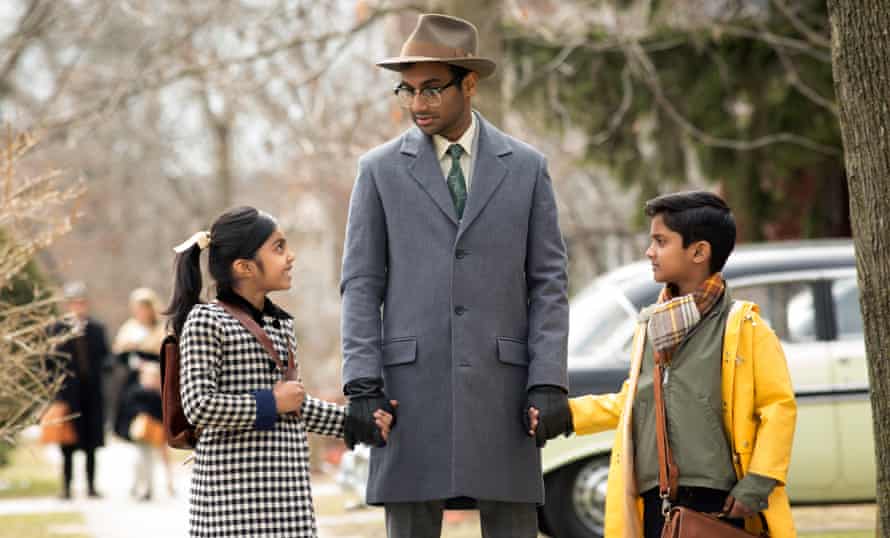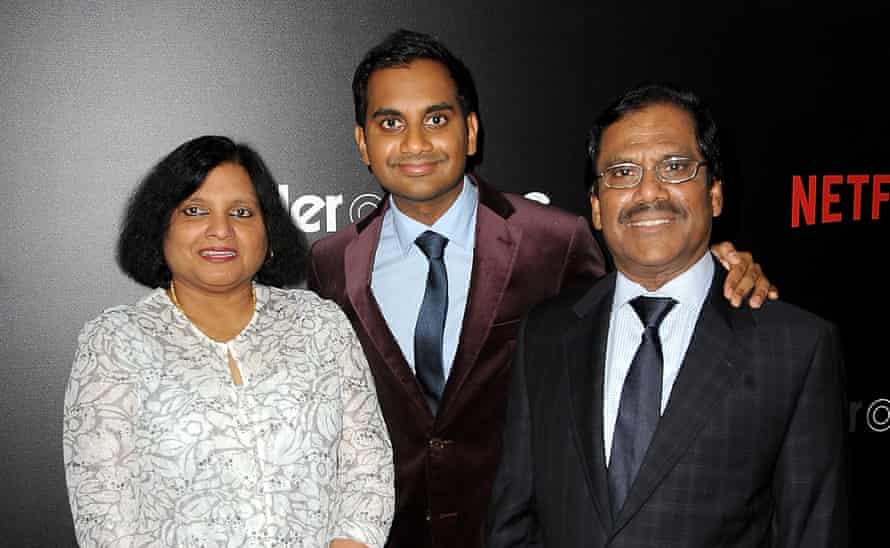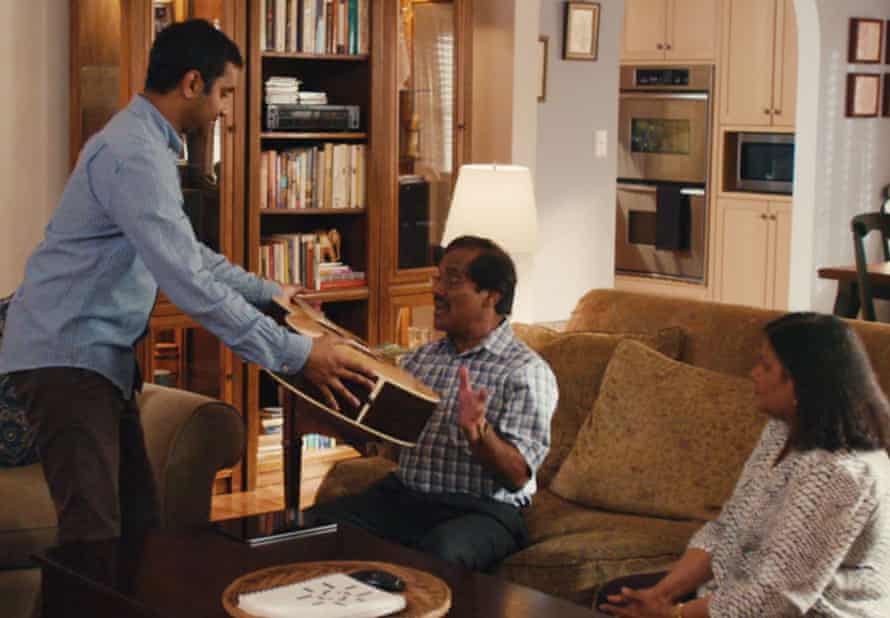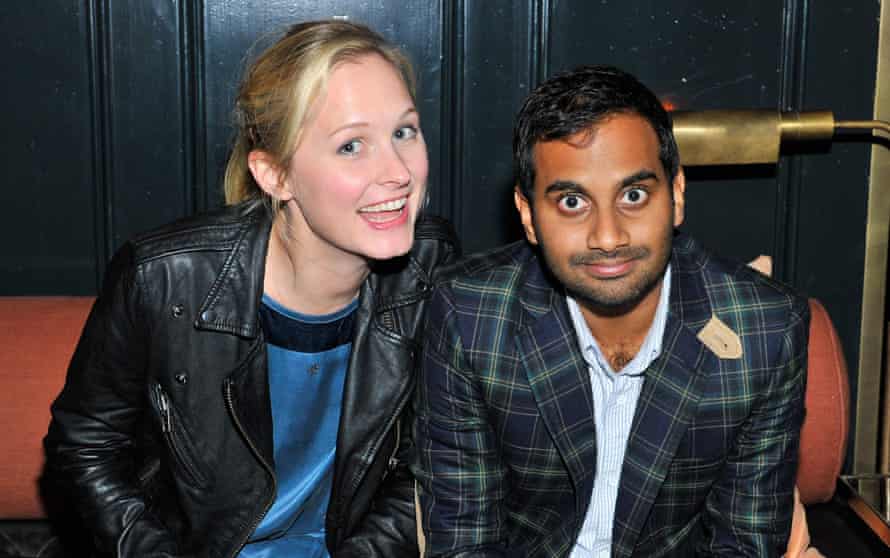Amy Poehler Not Funny Shit Eating Grin
Say the name Aziz Ansari and most people in this country will draw a blank. If you mentioned the cult US sitcom Parks and Recreation, then a small minority would recognise Ansari as Tom Haverford, aka Darwish Sabir Ismael Gani, the cocky if ineffective bureaucrat in parks administration.
Yet Ansari is established as a major new voice in comedy. He plays to sold-out arenas in America but also here in the UK, where his standup specials have attracted a devoted following. He's the beneficiary of a particular kind of nebulous 21st-century fame as a result of the borderless power of the internet. He is also responsible for a new, critically acclaimed Netflix sitcom Master of None , which as jack of all trades he co-wrote, directed and stars in.
On Boxing Day he was on conventional television in his British chat show debut on Jonathan Ross . It was a tough gig, placed as he was alongside a young actress from Downton Abbey , Ian McKellen, and Antiques Roadshow's Fiona Bruce. None of them seemed to have any more idea who he was than he appeared to know who they were. He acquitted himself pretty well with his impish grin and speedy line in social observation, telling a long story about the awkwardness of eating pork in front of his Indian Muslim parents. British multicultural sensitivities being what they are, you sensed the anxiety of the other guests and the audience about where the story might lead. Pork! Muslims! Trigger alert!
But cultural tensions and misunderstandings are Ansari's stock in trade. His speciality is holding up social conventions, particularly where they intersect with cultural boundaries, for humorous inspection. Master of None is set in New York where Ansari lives, and it's a familiar milieu of navel-gazing coffee bar habitués that we've seen before in Girls, Bored to Death and even Louie, the sitcom made by Ansari's fellow standup and former colleague on Parks and Recreation Louis CK. The lead character in Master of None, played by Ansari, is Dev Shah, an aspiring actor who is clearly based on Ansari himself. As if to underline the point, Dev's parents are played by Ansari's own parents.
What marks it out from the rest of the pack is the manner in which it explicitly grapples with the experiences of ethnic minorities in America. One episode looks at the plight of Indian actors in America, who can expect to play cab drivers or drugstore workers, invariably with bad sing-song accents. In the show Dev goes along to an audition for the part of a minor Indian character. But he refuses to do "the accent" and loses the job.
As with a lot of the show's material, the same thing happened to Ansari in real life. "Yeah, I went for auditions just like that one we depict in the scene," he recalls when we meet in a Soho hotel, "and I made a choice early on: I don't want to do that accent thing. I do it once, they'll keep asking me to do it."
Small in stature, he's got a comedian's outsized expressive features, all wide-eyed looks and a gloriously mischievous mouth. He likes to dress well and despite some heavy jet lag gives off an irrepressible energy.

His point is that if you want to change perceptions you have to resist stereotypes. The Indian accent is too often employed as a comic device at the character's expense, or a means of removing the character from the mainstream. But it was in the mainstream that Ansari wanted to be. And he wanted to be funny for what he said, not how he said it.
"For me the point of Master of None is that when people think of an everyman, they think of a white guy. They think of a straight white guy. And I think that's our conduit for a lot of the stories we've told in TV and film. But for a lot of people that's not the everyman. The everyman is everybody. Every single person regardless of race, gender, ethnicity, whatever. They have a story that we can all be interested in and everyone's life has drama and comedy that can make compelling narrative."
Race and representation is a complex area that manifests in different form in America from that in the UK, although in both cases it's common to assign peripheral roles to non-white actors. The answer, he says, is getting people from ethnic minorities into positions of creative power.

"If you don't write your own stuff no one is going to write it for you. The chances of someone wanting to take a blind shot for you… it's not going to happen. No one would have ever have written Master of None for me. I had to do it myself. Look, there are people like me, Shonda Rhimes and Mindy Kaling, but overall our entertainment is very white. It's not representative of the population of America. There are way more Hispanic people in America than the America we see on our entertainment. It's unbalanced."
He says in TV he's heard people express concern that a mainstream audience don't want to watch "ethnic" stories. "And that's really coded speech for 'I don't know if white people would be interested in watching this'. And it's bullshit 'cause people watch animated movies about fish!"
Asians of subcontinental heritage seem to suffer from a particularly low profile in America. Aside from Ansari, there's Kumail Nanjiani in Silicon Valley, Dev Patel, who's British, in The Newsroom, and then you get into shows like Homeland in which Asians play specifically Asian characters, usually terrorists, rather than everyday people who just happen to be Asian.
There's a way of addressing this territory that could be chippy and didactic, but Ansari is too alive to the comic possibilities to go down that route. I ask him if the world of Hollywood and entertainment stardom seemed all the more impenetrable when he was growing up because he was from an Indian background.
"No," he says, "it felt more impossible because I was from a small town in South Carolina."
He says he's proud of his southern roots because it's added a side to his character he might otherwise not possess. Anything that gives you added perspective, he says, is good. "There's a tendency to paint the south in broad strokes and say everyone there is an idiot or racist and I know it's not the case. There are those people, but there are dumb racist people in New York or LA or wherever."
Having been to an "overwhelmingly white" high school – "by overwhelming I mean pretty much everyone except me" – he attended NYU on a business degree. It was at college that he first recognised his talent for standup. His big influence at the time was Chris Rock, the African American heir to the scorchingly profane tradition that leads via Eddie Murphy back to Richard Pryor. And you can still hear some of Rock's swagger and attitude in Ansari's timing and cadences.
Of course some of the areas Ansari explores – racism, ethnic stereotyping, sexual politics – have been previously visited by Rock, in common with many other comedians. But Ansari has a softer, less confrontational style than Rock. He seems more interested in sharing real emotions with his audience.
He speaks, for instance, of how his parents met and came to America and the struggles they endured. It's quite warm and sentimental, and a very long way from Rock's notorious "When can white people say [the N-word]?" riff.
"I can't remember who told me this," he says, when I ask him about his willingness to venture into areas that are not strictly comic. "Maybe it was Dave Chappelle. But whoever it was said 'Whatever you're doing, just be interesting. If you're not funny but you're interesting, people will listen and you can eventually incorporate the comedy.'"
He reprises the story about his parents in Master of None in an episode devoted to his filial relationship. We see him attempting to appreciate the difficulties they've faced in uprooting and making a new life in a completely different continent and culture. He contrasts their struggle with his own easy, even spoilt existence, but for all his sympathy there's still a disconnect between parent and child, first generation and second generation immigrant.

"Everyone has issues with their parents," says Ansari. "And for me and Alan [Yang, the co-writer] the representation we showed was of the immigrant story, parents a little closed-off, kids a little ungrateful, kids that learn about their parents' story and then aren't sure what to do with that information. It's all kind of muddy waters but you have to get in those waters and see what's up. A guy came up to me on a flight the other day, a white guy, and said 'Oh, that parents episode really hit me. My dad's really closed-off and we've had a tough time developing a relationship.' That's what that episode is about."
In truth his parents are not the finest actors, and some of the scenes are awkward for the wrong reasons, but it's refreshing to see a comedian attempt to explore familial themes with an honesty that risks sincerity.
Not that Ansari is without an edge. Last January he entered into a social media war with Rupert Murdoch, following the Charlie Hebdo massacre, when the media mogul tweeted "Maybe most Moslems peaceful, but until they recognise and destroy their growing jihadist cancer they must be held responsible." Ansari, an irregular tweeter, responded to his then 5 million followers (now almost 9 million), by sarcastically asking for advice on what his 60-year-old parents in North Carolina could do to destroy terrorist groups.
He then went on to launch a series of ever more aggressive tweets under the hashtag RupertsFault. "Are you responsible for the evil shit all Christians do or just the insane amount of evil you yourself contribute to?" He called Murdoch a "racist piece of shit" and accused the Catholic octogenarian of being responsible for all paedophilia committed by Catholics.
It played well to his fans, who joined in, but what started out as a nicely acerbic put-down of ignorance, quickly descended into infantile name calling. For all his understandable outrage, there was a sense that Ansari, as sometimes happens in his standup act and Master of None, was a little too happy to let fly in his comfort zone.
Now 32, Ansari has been a comedian since he was a teenager. He knew straight away that he could make a living out of it, and with that knowledge he found himself losing interest in his studies. Ever since, standup has been his backup, the means not just of making money but also of making sense of the world.
It's also given him an alternative, a bigger sense of choice. "It's like having a superpower," he says. "'Oh, you're not going to put me in that movie, I'll go tour and make more money than I would in your dumb movie.' Most movies, most TV shows, they're bad. There are very few good shows or movies that come out and if you're not in one of those, you don't have to take the work if you're a standup. No one has that luxury in show business except standups."
Much of the work Ansari has taken on has been of notably high quality. As he built a name for himself on the comedy circuit he landed a well-received role on MTV comedy sketch show Human Giant, and played a part in the much-lauded comedy Flight of the Conchords. He's also appeared in several comedy films, including the Russell Brand vehicle Get Him to the Greek and Judd Apatow's Funny People.
But it was his role as Tom Haverford in Parks and Recreation with Amy Poehler and Rob Lowe that was his big breakthrough. Made by the same people who produced the American The Office, it ran for seven seasons and attracted guest stars of the calibre of Bill Murray and Paul Rudd.
"I was very lucky to work on stuff I was happy with, like Parks," says Ansari, "but there's a big difference between doing that and your own thing."
Towards the end of Parks he got talking to Alan Yang, one of the show's main screenwriters, about developing a show of his own. He says that what they both wanted to do was show Indian and Asian men as fully rounded characters who weren't desexualised.
"Well, the guys who made the show are an Indian guy and an Asian guy so we're going to be pretty good at representing that because that's who we are. If you're a white guy writing a show it's not something you think about."
In one obvious sense that is unquestionably true. But really most of the dialogue could have been written by a white guy and then played by actors who happen not to be white. It's not as if Ansari is steeped in Indian culture. To the extent that it comes up, it highlights his separation from traditions and rituals. The difference is that Dev/Ansari has this cultural baggage he doesn't know what to do with and he has to contend with ethnic expectations and presumptions that border on the racist. But Dev's cultural reference points are, like Ansari's, focused on American popular culture, and his concerns are the everyday. At root the show's message is that, for all the difference, there is really no difference.
The first episode opens with Dev having sex with a new date when his condom breaks. It's played in a very naturalistic style with a mixture of angst and wisecracks. "I've had condoms break before and thought 'What do we do?' That's definitely happened. The challenge is how to present a version that feels fresh. And the way to do that I found was really to go very personal. The thing that I found to be true in writing is that the most personal is the most universal."
Sexual politics or the politics of sex informs a lot of Ansari's work. He's even co-written with a sociologist a New York Times bestseller book on the subject (for a reputed $3.5m advance)entitled Modern Romance, in which he looks at the modern etiquette of such emotional minefields as online dating and texting. What do you do when someone doesn't reply to your text? He recalls the case of a woman he calls Tanya who, in the middle of a text conversation, suddenly goes silent, propelling him into a "tornado of panic and hurt and anger".
As the empty hours creep by, he writes: "I'm so stupid! I should have typed 'Hey' with two y's, not just one!' And then later. "Did Tanya's phone fall into a river/trash compactor/volcano? Did Tanya fall into a river/trash compactor/volcano?? Oh no, Tanya has died."
Tanya doesn't die. She just did what many people do today and stopped communicating. Ansari's pain seems genuine and raw in the book. When something like that happens to him in life, does he think, "That's something I can work into my act?"
"Anytime you feel something strong, pain or joy, if you're a comedian or a writer, then you've got to note it and find out what's creating that strong emotion. What's beautiful about it is that it's a common experience. That's the point of the Modern Romance book. This is a mess but we're all in the same boat, so let's just be nice to each other on the boat."
There's that desire to be "nice" again, not often the first instinct of a comedian. He likes to admonish men in his act for their predatory attitudes towards women, telling the story of how a creep stalked a female friend of his. He says he covers such subjects because he wants to be "part of the discussion". If anything these displays of social conscience have attracted rather than deterred fans. He can pack out the 20,000-capacity Madison Square Garden with his standup act, something that even Ansari, who seems to take success in his stride, is impressed by.

"There's no way you could have told the young guy doing New Talent night that that was every going to happen. No way I would have believed it."
He has been in a relationship with chef Courtney McBroom for more than two years, but says that he's commonly asked if being famous makes him suspicious of women who take an interest in him. The idea makes him laugh.
"I mean, strangers are more likely to know who you are, and are more inclined to want to get to know you. But people's first thought is, 'What if someone's trying to use you?' What are they using me for? What – do they go out with me twice and ask me to buy them a car or something? The real issue of being famous and dating is you're never in one place, you're always travelling, which is hard for you and your partner. People are really disrespectful to the non-famous partner. People ignore them, or use them to try to get to the famous person. That kind of stuff is weird. But if some woman comes up to me at a bar because she knows my work – great, I made that work. I'd much rather someone be attracted to me because of something I made rather than 'Oh, his face looks nice.' I didn't do anything to earn that face."
It's a typical Ansari riff-cum-rant, done with a frenetic flourish that, almost furtively, has accrued a legion of fans. But the secret is a secret no more. Ansari, the small guy from South Carolina, is set to become a big star.
Master of None is streaming on Netflix now
Source: https://www.theguardian.com/tv-and-radio/2016/jan/10/aziz-ansari-being-funny-is-like-having-a-superpower-master-of-none-interview
0 Response to "Amy Poehler Not Funny Shit Eating Grin"
Post a Comment